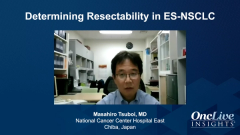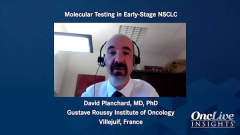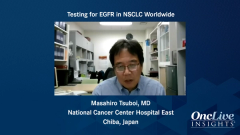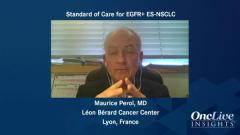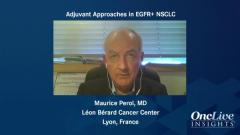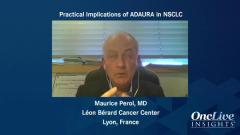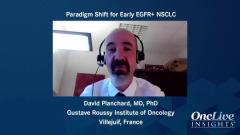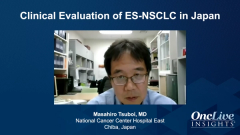
Molecular Testing in Early-Stage NSCLC
Episodes in this series

Maurice Perol, MD: The question of molecular testing for patients with early-stage non–small cell lung cancer was not a real question until today because, at this point, there were no recommendations to perform molecular testing in resected non–small cell lung cancer since the treatment strategy did not depend on the molecular testing results. Generally, ALK and ROS1 assessments are done with reflex testing of the preoperative biopsy in the case of adenocarcinoma or on the resected sample. Sometimes a complete molecular profile is performed on the same biopsy or on the surgical sample, but it is unusual in my country, France, due to the reimbursement problems.
Nevertheless, we used to perform molecular testing in nonsmokers or light smokers in order to exploit the surgical sample for a better DNA or RNA quality on archival samples at the time of possible metastatic relapse. With the advent of adjuvant therapy with osimertinib in EGFR-mutated non–small cell lung cancers, the strategy will be reviewed. It’s very likely, that the molecular testing will also be performed in early stage of the disease. The pathologist is involved in this process; we need to ask for the pathologist for molecular testing in the case of early-stage, which is not the case for advanced stages of the disease, for which reflex testing is more usual.
David Planchard, MD, PhD: Molecular testing is not systematically done in most of the centers because we don’t have a targeted treatment demonstration that should be applied for this population with a specific molecular alteration as we do in advanced-stage disease, in which we test for EGFR, ALK, ROS1, BRAF, and so on. For early-stage, we know we have a nice result with the ADAURA trial, with EGFR as an example. We push to systematically test patients, particularly for EGFR, and we might expect to have other results for the other types of molecular alteration. Nowadays, there is no clinical implication except to include patients in specific clinical trials. That’s why we generally don’t perform it; it’s costly, and if you have a molecular alteration, there is no clinical application.
We try to push to have a histological examination. We try to avoid cytology except if we don’t have a choice because we know for the diagnostic histological type, it’s important, and cytology can be challenging sometimes. If you want to perform other molecular testing in the disease, you need to have a minimum amount of DNA and tumor cells. It’s better to have a good histological diagnostic. For some patients, it might be challenging, so that’s why we can do it by cytology. I would say it’s a minority of patients who have a cytologic confirmation of the diagnostic. It’s mainly a histological confirmation.
We know how to do the testing. You have the tissue, and you push the patient for surgery. You have the tumor resected, so it’s not a question of the amount of tumor tissue. It’s a question of demonstration of the benefit and what to do if you have a molecular alteration. It’s costly. That means if you spend money and there is no clinical implication, we might understand but won’t do it. That’s why we need to have specific guidelines, particularly specific demonstration that brings a benefit in terms of the patient becoming disease-free—also in terms of curability and improved overall survival for this population—to confirm that we need to do this molecular testing. Otherwise, we wait for recurrence. Unfortunately, if there is any recurrence, we might treat the patient for metastatic disease afterward. In this case, we have the testing that should be done because this is 2020. Nowadays, we need to try to test the early-stage disease.
Transcript Edited for Clarity


